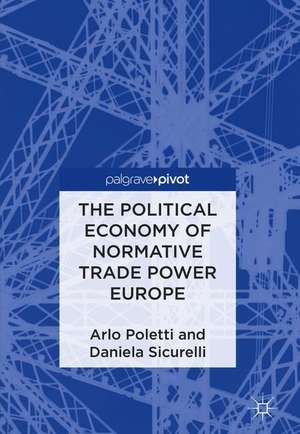The Political Economy of Normative Trade Power Europe
Autor Arlo Poletti, Daniela Sicurellien Limba Engleză Hardback – 23 mai 2018
| Toate formatele și edițiile | Preț | Express |
|---|---|---|
| Paperback (1) | 378.12 lei 43-57 zile | |
| Springer International Publishing – feb 2019 | 378.12 lei 43-57 zile | |
| Hardback (1) | 384.31 lei 43-57 zile | |
| Springer International Publishing – 23 mai 2018 | 384.31 lei 43-57 zile |
Preț: 384.31 lei
Nou
Puncte Express: 576
Preț estimativ în valută:
73.54€ • 76.98$ • 60.85£
73.54€ • 76.98$ • 60.85£
Carte tipărită la comandă
Livrare economică 07-21 aprilie
Preluare comenzi: 021 569.72.76
Specificații
ISBN-13: 9783319788630
ISBN-10: 3319788639
Pagini: 129
Ilustrații: XI, 131 p.
Dimensiuni: 148 x 210 mm
Greutate: 0.33 kg
Ediția:1st ed. 2018
Editura: Springer International Publishing
Colecția Palgrave Macmillan
Locul publicării:Cham, Switzerland
ISBN-10: 3319788639
Pagini: 129
Ilustrații: XI, 131 p.
Dimensiuni: 148 x 210 mm
Greutate: 0.33 kg
Ediția:1st ed. 2018
Editura: Springer International Publishing
Colecția Palgrave Macmillan
Locul publicării:Cham, Switzerland
Cuprins
Chapter 1: Introduction.- Chapter 2: The EU as a 'Normative' or Traditional 'Market' Trade Power.- Chapter 3: Trade Agreements with Latin American Countries.- Chapter 4: Trade Agreements with ACP Countries.- Chapter 5: Trade Agreements with ASEAN Countries.- Chapter 6: Conclusions.
Notă biografică
Arlo Poletti is Associate Professor of International Political Economy at the University of Trento, Italy.
Daniela Sicurelli is Associate Professor of International Relations at the University of Trento, Italy.
Daniela Sicurelli is Associate Professor of International Relations at the University of Trento, Italy.
Textul de pe ultima copertă
‘In this eloquently written book, Arlo Poletti and Daniela Sicurelli assess rival explanations for the European Union’s trade policy towards small and developing trading partners. Through careful cross-case comparison, they uncover how and why the motives of policy-makers, business groups and NGOs make high normative aspirations diverge from actual negotiation outcomes.’
— Dirk De Bièvre, University of Antwerp, Belgium
This book critically engages with a long tradition of scholarly work that conceives of the European Union as a peculiar international actor that pursues a value-based, normatively oriented and development-friendly agenda in its relations with its international partners. The EU is a pivotal player in international trade relations, holding formidable power in trade but also exercising substantial power through trade. Trade policy therefore represents a strategic field for the EU to shape its image as a healthyeconomy and a global power. In this field, the EU has declared a twofold ambitious goal, namely that of fostering economic growth in Europe while, at the same time, promoting development and growth abroad, both in developed and developing countries. In other words, the EU aims to increase its competitiveness in world trade while acting as an ethical and normative power. Here, Poletti and Sicurelli explore the tension between these two roles.Arlo Poletti is Associate Professor of International Political Economy at University of Trento, Italy.
Daniela Sicurelli is Associate Professor of International Relations at University of Trento, Italy.
— Dirk De Bièvre, University of Antwerp, Belgium
This book critically engages with a long tradition of scholarly work that conceives of the European Union as a peculiar international actor that pursues a value-based, normatively oriented and development-friendly agenda in its relations with its international partners. The EU is a pivotal player in international trade relations, holding formidable power in trade but also exercising substantial power through trade. Trade policy therefore represents a strategic field for the EU to shape its image as a healthyeconomy and a global power. In this field, the EU has declared a twofold ambitious goal, namely that of fostering economic growth in Europe while, at the same time, promoting development and growth abroad, both in developed and developing countries. In other words, the EU aims to increase its competitiveness in world trade while acting as an ethical and normative power. Here, Poletti and Sicurelli explore the tension between these two roles.Arlo Poletti is Associate Professor of International Political Economy at University of Trento, Italy.
Daniela Sicurelli is Associate Professor of International Relations at University of Trento, Italy.
Caracteristici
Addresses what criteria should be met for the EU to be characterized as “normative trade power” Analyses the EUs role as the multilateral and regional trade governance provider Considers which factors account for the observed mismatch between the rhetoric of “normative trade power Europe” and EU trade policy strategies
